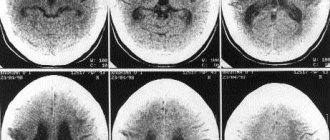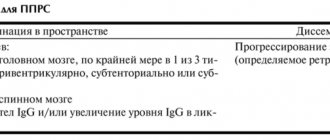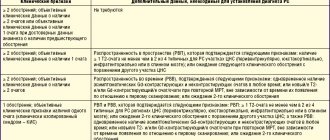Multiple sclerosis is not a death sentence (Institute of Medical Communications)
Irina Vadimovna Kazantseva, neurologist, Ph.D. , head of the 1st neurological department of the Federal State Budgetary Institution "Clinical Hospital No. 1" of the Administration of the President of the Russian Federation (Volynskaya), told the Institute of Medical Communications (IMC) about what young patients face, how to lead a full life with a neurological disease and why multiple sclerosis - not a sentence.
The Institute of Medical Communications was founded in Paris in 1992 with the goal of qualitatively improving communication in medical and pharmaceutical activities. The goal of the project was to align the standards and procedures for providing medical care, including medicinal care, to the population of all countries of the world.
The activities of the institute are non-profit and carry educational motives aimed at the implementation of modern methods of treatment, management and control of the medical industry.
The Institute's target audiences are doctors, healthcare organizers, patients, the media, representatives of legislative and executive authorities, pharmaceutical and medical companies.
The Institute brings together the efforts of all stakeholders and organizations in the field of health care to improve the health of the population everywhere.
IMC: What problems do patients most often come to you with?
Irina Vadimovna: About half of all patients are admitted with chronic cerebrovascular insufficiency. 30% are patients with various types of pain: back pain syndromes, facial pain and headaches. Recently, the flow of patients with rare neurodegenerative pathologies has increased: Alzheimer's disease, Pick's disease. We also receive patients with multiple sclerosis for various neurological pathologies.
IMC: Probably each age has its own neurological diseases?
Irina Vadimovna: 20% of our patients are over 80 years old. The older the patient is, the more likely it is that he has accumulated some genetic defects or age-related changes that cause the problem.
Over the past few years, we have become deeply involved in cognitive impairment. Patients aged 30 and 40 come to us with complaints of poor memory. We have evidence and examinations that can show that memory impairment in a given patient significantly exceeds the threshold that exists in this age group.
In a young patient, these problems are most often associated with neurotic disorders. We all live in a state of stress and sometimes the brain is simply unable to absorb information and dismisses it as unnecessary. Our task is to identify the cause of violations. If it is a neurosis, then we give appropriate recommendations: depending on the cause, we prescribe mild nootropic or antioxidant drugs, recommend procedures to help you relax, and conduct classes with a neuropsychologist.
IMC: How does a doctor work with young patients with neuroses?
Irina Vadimovna: The task of a neurologist is to divide patients into two categories: with organic damage to the nervous system and with neurosis. Both categories may have the same symptoms: headaches, dizziness, but the causes are different.
Patients are often perplexed: “I came to you with a headache, and you say that the reason is that I cannot cope with my emotional stress.” We must examine the patient and show that the cause of headaches or heart pain is purely emotional.
IMC: How do you feel about the widespread practice of self-medication today?
Irina Vadimovna: I really don’t like it when patients start sitting on forums and reading annotations for medications. This means that the patient has not found a doctor who would become his assistant, advisor, or friend. A specialist must predict, warn, and help cope with symptoms. As a rule, help on forums is sought by those who have not been explained what and how to do, or by people with sad experiences with medicine. Our patient should not read discussions on forums. He must find his doctor or a medical institution where they will do everything possible to preserve his health.
IMC: What principles do you follow when working with patients?
Irina Vadimovna: The very atmosphere of our hospital has a psychotherapeutic effect and helps the patient relax. Our medical institution is an island of silence in stormy Moscow. Centuries-old trees grow on the territory, birds sing, squirrels jump. Patients do not have the feeling that they are in a hospital, but rather in a sanatorium-resort institution. Even our employees often wear colored gowns instead of white ones, so as not to create the impression of a standard hospital, which is associated with unpleasant odors, pain, and tears.
Our department professes the principle: if after communicating with the doctor the patient does not feel better, then he did not see the doctor. In relation to multiple sclerosis, we have a rule: we report every patient to whom we have given this diagnosis, while he is still being observed with us, to the Multiple Sclerosis Center in Moscow. This is the coordination center that is responsible for providing our citizens with free expensive medicines. At the moment when the patient needs to switch to anti-relapse therapy, they will already know about him and, thus, he will immediately be able to receive all the necessary drugs.
IMC: Do patients with a neurological pathology such as multiple sclerosis require special treatment?
Irina Vadimovna: This is written in all the manuscripts devoted to multiple sclerosis, we see this too: no two patients with multiple sclerosis who would have common problems. Patients are all different. You won’t see any common symptoms: someone came with transient blindness in one eye, someone with a distorted face because they have neuropathy of the facial nerve, for someone multiple sclerosis debuted through facial pain - trigeminal neuralgia.
Today, all necessary services have been created for patients with multiple sclerosis. Most importantly, he must understand the need for treatment and be regularly monitored by a doctor.
IMC: How many years can the period from the manifestation of the disease to the patient’s disability last?
Irina Vadimovna: Multiple sclerosis can occur with virtually no exacerbations, or it can recur regularly.
I have a patient that I have been seeing for 18 years. For many years, even her relatives did not know that she had such a serious illness. For 18 years, while using anti-relapse therapy, she had no exacerbations. She drives, works, and has no neurological defect. And there is a patient who was diagnosed 2 years ago, and she comes to us 3-4 times a year with exacerbations.
Much depends on how a person behaves and how deeply he listens to our recommendations. We had one patient whom we diagnosed with multiple sclerosis. She passed the selection and was going to go to a reality show in Mexico, where there was crazy heat, sun, and physical activity, which was strictly forbidden to her. But she decided that this was more important for her, and she went.
In medical practice, favorable and unfavorable prognostic signs have been identified. It is believed that the earlier a person gets sick, the milder and more prosperous the course of multiple sclerosis will be. Gender also has an impact: in women, the disease is more common and has a milder course. Even by what first symptom develops in a person, one can judge the development of the disease. And yet, with multiple sclerosis, everything is very individual. This disease is like a detective story: despite the fact that it has been studied a lot, a lot has been described, even more questions arise.
IMC: Is therapy also prescribed to patients individually?
Irina Vadimovna: There are two problems in the treatment of multiple sclerosis: to relieve exacerbation and clinical manifestations caused by the appearance of a new plaque, and to prevent relapse. As a rule, the symptoms with which the patient was admitted go away by the end of treatment in the hospital. Next, you need to understand when to start anti-relapse treatment and teach the patient how to carry it out.
The decision to prescribe a particular drug is made after the appearance of a second exacerbation. The difficulty is that after the symptoms are relieved, we send the person home, and we do not know when the next attack of multiple sclerosis will occur. If the patient was unable to relieve all symptoms after the first lesion, this may be a reason to prescribe anti-relapse therapy after the first episode.
Anti-relapse drugs are highly effective, and the state provides these expensive medications to patients, the main thing is adherence to treatment. However, many of them are difficult to tolerate. There are drugs from the group of interferons that a person injects every night or at a less frequent frequency, and each time after the drug is administered, the patient experiences symptoms similar to a flu attack: at night his temperature rises, he experiences muscle pain, and it is impossible to skip the injection.
If a particular drug is fundamentally unsuitable for a person, we have the opportunity to replace it with a drug from another group. All these problems are individual, but solvable. Much depends on how the person adheres to the treatment regimen. Some give up, and after some time they come to us with an aggravation.
IMC: Do doctors encounter difficulties when working with patients with multiple sclerosis?
Irina Vadimovna: Educating a patient and telling them how to live with an illness is a difficult task. But patients with multiple sclerosis are fighters, they rarely give up and always come to the doctor with hope.
We try not to set strict restrictions. If a patient has the opportunity to get a little pleasure from life, we do not prohibit it. For example, a person asks if he can go traveling. We try to find options so as not to completely limit a person and not change the quality of life for the worse.
Our doctors spend part of their working time on the phone with patients. If a patient has questions, he or his relatives can always call us and discuss any problem that has arisen.
http://www. instmedcom. org/news/esli-posle-obshcheniya-s-vrachom-pacientu-ne-stalo-legche-znachit-byl-ne-u-vracha
How does a cold or flu affect MS?
No one likes to be unwell, but common illnesses like colds and flu are something we have to live with. It has been suggested that colds often serve as a periodic reset of the immune system. Multiple sclerosis is neither a common nor natural disease. Combining the common with the unnatural, we get an unusually severe disease in its essence and duration. The last thing we need is any additional hit to our immune system.
The immune system processes in MS are either already responding inappropriately or are putting the body at risk on a daily basis.
When you throw a grenade at a monkey, two things happen:
- Firstly, the body is not able to effectively and purposefully respond to the disease. This usually results in the duration of the disease having a longer period of time. With a weakened ability to fight the disease, existing symptoms caused by MS, such as fatigue, muscle pain, numbness and heat intolerance, may become more pronounced.
- Secondly, common diseases can “start” a relapse of MS (cause an exacerbation). An overly excited immune system trying to solve a problem can lead to additional problems that have nothing to do with the original illness.
“This happened after the flu last year. After recovering from this very disease, I discovered that new neurological problems had arisen associated with severe headaches, visual disturbances and constant ringing in the ears. I had an exacerbation of MS after an illness” - a patient with MS .
“Now, when I am recovering from a common illness, I notice everything unusual that goes against the usual symptoms of well-known diseases (for example, a cold), otherwise, if an unusual symptom lasts longer than a day, I know what to do: 1) call the doctor, 2) take a course of hormones as quickly as possible,” says Andrey (he has had MS for 11 years) .
How to cope with exacerbations of MS can be read in the article “Exacerbation of multiple sclerosis, what to do. How to prevent exacerbation."
The best we can do is try to stay healthy, both mentally and physically, and look to the future patiently.
LEAVE IT IN THE COMMENTS
Do you often get colds? Have you noticed that they are affecting your MS? Do you prevent such diseases? What does your doctor advise?











